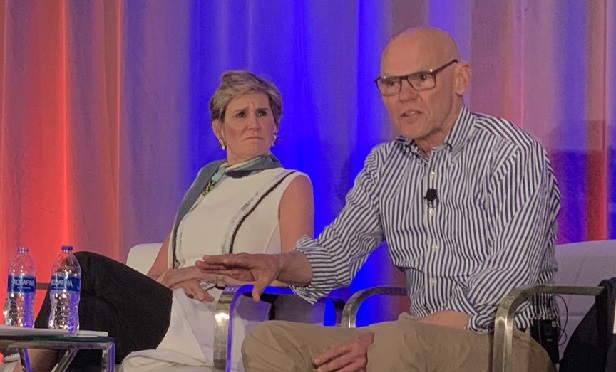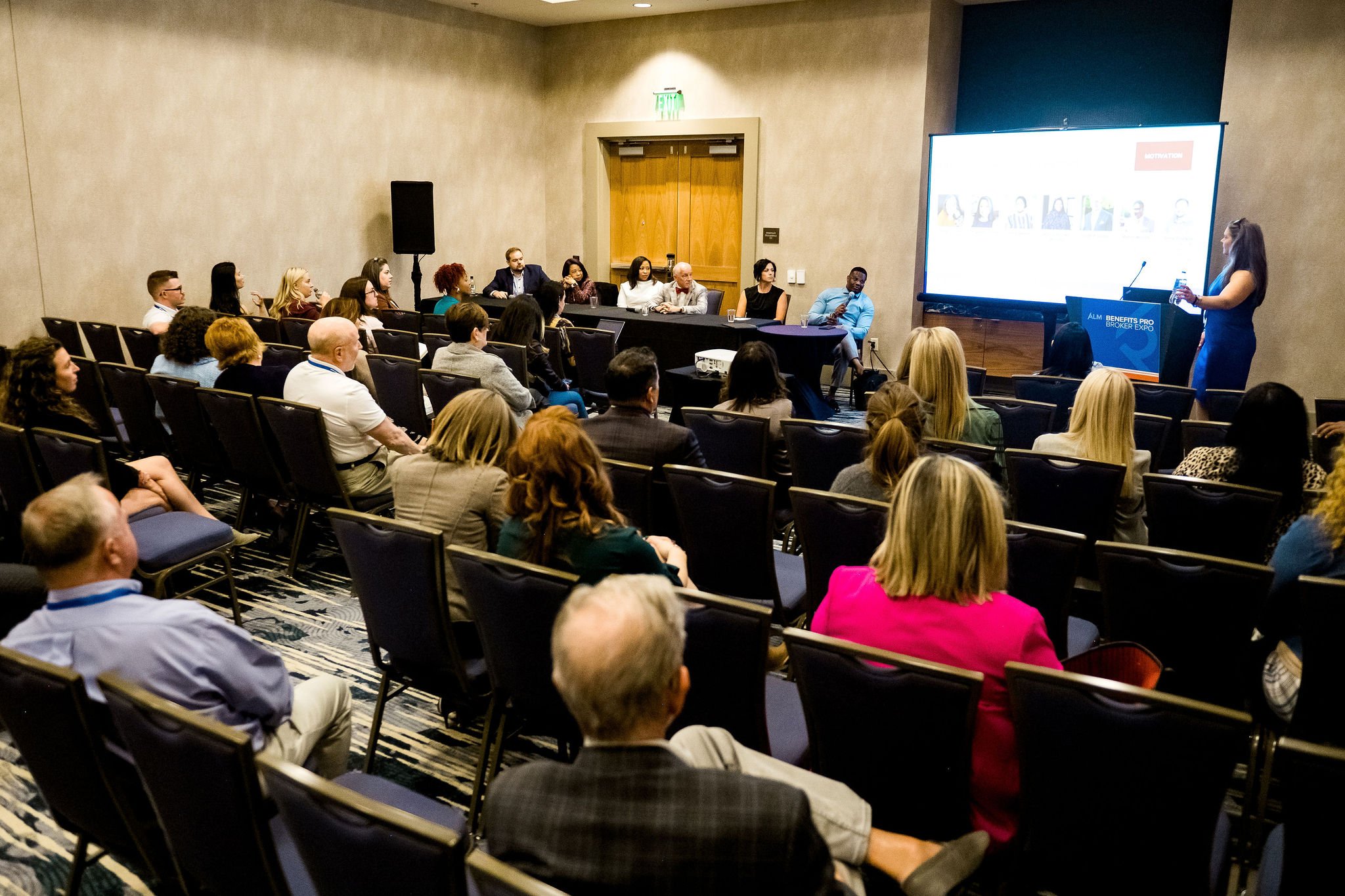 Political experts James Carville and Mary Matalin shared their insights on the current political landscape and what to expect in 2020 at the recent BenefitsPRO Broker Expo in Miami, Florida. (Photo: Thomas Phillips/ALM)
Political experts James Carville and Mary Matalin shared their insights on the current political landscape and what to expect in 2020 at the recent BenefitsPRO Broker Expo in Miami, Florida. (Photo: Thomas Phillips/ALM)
The polarization in the current American political landscape has crippled any sense of bipartisanship. Unfortunately for the public who rely on politicians to get work done in the interest of the American people, this can result in gridlock and empty promises. As the 2020 election nears, voters will seek out candidates who can enact change and alter their lives for the better. But this will only occur if both sides come together and foster a greater sense of bipartisanship. Political experts James Carville and Mary Matalin, who have long embodied this sentiment as husband and wife, shared their insights on the current political landscape and what to expect in 2020 at the recent BenefitsPRO Broker Expo in Miami, Florida.
Understanding the current political climate requires an examination of the role of media. In particular, social media has created a demand for around-the-clock coverage. “The paradox of the Information Age is that it affects politics—as it affects everything, actually—we have exponentially more information and we are arguably no wiser,” Matalin told expo attendees. She believes the media has been reduced to sound bites and 240-character tweets, which isn't an ideal vehicle to understanding policy.
Alternatively, the cloak of anonymity produced by the internet has fermented greater incivility between those with entrenched viewpoints. This is most evident with Russia's interference in the 2016 elections, much of which was conducted with targeted efforts over the internet. Not everyone was a victim, however, which speaks to some of the upsides of the internet. “Young people, I think, see right through this. They've been sort of conditioned to be skeptical to what they're looking at,” Matalin said. “But they've also unfortunately been siloed into revalidating their own perspective.”
To go forward, Matalin thinks there must be a return to first principles. The things the founders agreed on, even though they disagreed with each other in many areas, included an informed populous and a free press. “With so many people in the field, the media being what it is, the education level of policy understanding today,” Matalin is concerned for the 2020 election and encourages everyone to do their own research.
The most staggering aspect of polarization in Carville's perspective is geographic polarization. In the United States, there are some 3,100 counties across the country. In order to qualify as a supermajority county, the county has to vote for one party by more than 50 percent. He says in the U.S. in 1992, there were 96 supermajority counties; in 2016, there were over 1,200.
“What that tells you is that people are clustering together by ideology,” Carville noted. After the 2000 election, the strategic doctrine for some time was that there were no voters in the middle, “that every election was going to be decided by who could energize their own voters.” The 2018 election defied this notion.
“I cannot tell you what a big deal 2018 was in political history,” Carville added. “2018 had the highest turnout of any off-year election since women were granted the right to vote.” He says Democrats were energized following the 2016 election, with Republicans quickly following suit after the Brett Kavanaugh hearings. Ultimately, everyone came out, but Carville said “the differential in that election was not the base, it was the suburbs.” He believes these swing voters will determine the 2020 election.
The role of government in health care is one of the few contentious issue that members of both parties agree must be addressed. Paul Wilson, editor in chief of Benefits Pro, asked Matalin and Carville where they thought Medicare for All or single-payer might go next, and if there was a realistic chance that universal health care would exist in the U.S.
While acknowledging that something has to be done about the cost of health care, Matalin believes nothing will happen politically, despite Republicans running for six years on the repeal-and-replace of Obamacare. President Trump stated he was willing to wait until the 2020 election to vote on health care, and Matalin believes he may issue an executive order on the matter “as he has in many other controversial issues.” Carville expressed doubts over the chance of Medicare for all because everyone would be in Medicare, something the approximately 160 million people who have employee-based health insurance are unlikely to forego willingly.
No matter the issue, educating future decision makers to vote will determine what initiatives see the light of day. The youth vote has been episodic, but Matalin says the best candidates are the ones who use Information Age tools to encourage and incentivize face-to-face contact. Eventually, the issues of today—whether it be health care or student loan debt—will be the issues of tomorrow for future voters, so Matalin said “they should engage with their own futures.”
With the 2020 election steadily approaching, Matalin predicted Republicans will win. Carville, however, said the numbers don't bode well for Trump and Republicans. While Democrats are in a good position, his advice for them is to “go back and have a debate about something people are actually talking about themselves.” After all, Carville concluded, “politics is all about relating to people about things that matter to people.”
Read more of our Expo coverage:
- Broker Expo keynote: How to create your S-T-A-M-P
- Meeting with the C-Suite: Don't mention health insurance
- Knowing your worth, and other strategies for brokers to build their businesses
© 2025 ALM Global, LLC, All Rights Reserved. Request academic re-use from www.copyright.com. All other uses, submit a request to [email protected]. For more information visit Asset & Logo Licensing.








